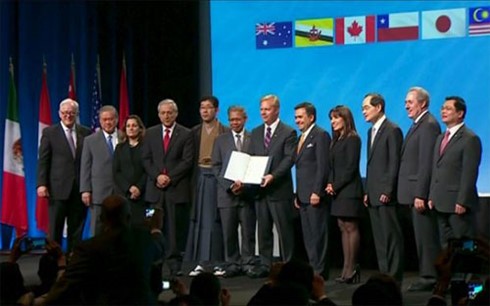(VOVworld) – The Trans-Pacific Partnership Agreement (TPP) was signed in Auckland, New Zealand, on February 4th after 20 rounds of negotiations. The TPP will generate momentum for national development but will bring grave challenges as well.
 |
Representatives from 12 signatory countries of the TPP
|
The TPP will take effect when ratified by at least six of the 12 signatory countries. It will be the world’s biggest free trade area, with 800 million people and a combined GDP of 28 trillion USD, accounting for 30% of global trade revenue and 40% of global productivity. This pact has taken into consideration the varying interests and development levels of its members and aims to boost their collective economic growth.
A driving force for Vietnam’s export, particularly garments and textiles products
Economists estimate that the TPP will increase Vietnam’s GDP 23.5 billion USD in 2020 and 33.5 billion USD in 2025. Zero percent tariffs in big markets like the US, Japan, and Canada will enable Vietnam to increase its export of garments, textiles, footwear, and seafood. The pact will also help Vietnam draw foreign investment to its high tech sectors.
Dang Phuong Dung, Secretary General of the Vietnam Textile and Apparel Association, said: “The TPP will generate a lot of benefits for Vietnamese enterprises, particularly the textile and apparel sector. Signed FTAs and the TPP will reduce tariffs for imported products.”
Opportunities and challenges
The export-import revenue of TPP members is forecast to reach 230 billion USD. Vietnam’s trade is expected to increase 20% to 30%. In order to take full advantage of the pact and promote its potential in international integration, Vietnam should adjust its policies to improve its comparative advantages.
The TPP sets high-standard criteria, commitments, and strict implementation requirements for trade, investment, intellectual property, competitive policies, state enterprises, government purchasing policies, employment, and the environment. Vo Tri Thanh is former Director of the Central Institute for Economic Management: “A majority of the TPP deals with national policies. Non-tariff barriers and policies are major obstacles. Vietnam’s reform will determine our benefits in the TPP. We need to reform the institutions of public investment, state-owned enterprises, credit organizations, the business environment, and resource distribution to fine tune the market mechanism.”
Preparing for TPP implementation
Minister of Industry and Trade Vu Huy Hoang said the TPP will help Vietnam elevate its status internationally. During the 5 years of negotiations, the TPP has insisted on the interests of involved parties and people. Mr Hoang said Vietnam has to prepare for the TPP’s ratification:
“First, we have to communicate the facts about the pact to enterprises that will be affected. Second, we need to improve our legal system. Third, the Ministry of Industry and Trade has to lead the implementation of the agreement by coordinating ministries and sectors and supporting business participation.”
The TPP is expected to take effect after 2018.